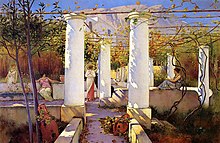Charles Caryl Coleman: Difference between revisions
Cyberbot II (talk | contribs) Rescuing 1 sources, flagging 0 as dead, and archiving 0 sources. #IABot |
|||
| Line 9: | Line 9: | ||
Born and raised in [[Buffalo, New York]], Coleman studied art under [[William Holbrook Beard]] "and an itinerant painter, [[Andrew Andrews]] whose real name was Isaacs." Between 1859 to 1862, Coleman studied in [[Paris]] under [[Thomas Couture]], returning during the [[American Civil War]] to serve with the Union Army during which he was seriously wounded and recovered in [[New York City]]. He returned to Europe in 1866 with fellow painters [[William Morris Hunt]] and [[Elihu Vedder]].<ref name="askart.com"/> In 1865, he was elected into the [[National Academy of Design]] as an Associate Academician. |
Born and raised in [[Buffalo, New York]], Coleman studied art under [[William Holbrook Beard]] "and an itinerant painter, [[Andrew Andrews]] whose real name was Isaacs." Between 1859 to 1862, Coleman studied in [[Paris]] under [[Thomas Couture]], returning during the [[American Civil War]] to serve with the Union Army during which he was seriously wounded and recovered in [[New York City]]. He returned to Europe in 1866 with fellow painters [[William Morris Hunt]] and [[Elihu Vedder]].<ref name="askart.com"/> In 1865, he was elected into the [[National Academy of Design]] as an Associate Academician. |
||
After time in Paris and Brittany, he moved to a Roman apartment previously occupied by poet [[John Keats]] before finally settling in [[Capri]].<ref name="askart.com"/> He converted the former Santa Teresa convent into ''Villa Narcissus'' in 1870. A part of the villa was dedicated to a "palace of art" with antiquities and his own paintings.<ref name="umuc.edu"/> The villa was later purchased from him by [[Rose O'Neill]], his friend and also an American artist. O'Neill permitted Charles to live out the remainder of his days there,<ref>[http://smithsonianlibraries.si.edu/smithsonianlibraries/2009/10/charles-caryl-coleman-cartedevisite-aapg-library-.html ]{{ |
After time in Paris and Brittany, he moved to a Roman apartment previously occupied by poet [[John Keats]] before finally settling in [[Capri]].<ref name="askart.com"/> He converted the former Santa Teresa convent into ''Villa Narcissus'' in 1870. A part of the villa was dedicated to a "palace of art" with antiquities and his own paintings.<ref name="umuc.edu"/> The villa was later purchased from him by [[Rose O'Neill]], his friend and also an American artist. O'Neill permitted Charles to live out the remainder of his days there,<ref>[http://smithsonianlibraries.si.edu/smithsonianlibraries/2009/10/charles-caryl-coleman-cartedevisite-aapg-library-.html ] {{wayback|url=http://smithsonianlibraries.si.edu/smithsonianlibraries/2009/10/charles-caryl-coleman-cartedevisite-aapg-library-.html |date=20100611161409 }}</ref> and he remained at the Villa until his death. |
||
His work was exhibited in the United States and England.<ref name="askart.com"/> |
His work was exhibited in the United States and England.<ref name="askart.com"/> |
||
Revision as of 10:29, 30 January 2016




Charles Caryl Coleman (1840, Buffalo, New York–1928, Capri, Italy) was an American-born Italian painter.[2]
Born and raised in Buffalo, New York, Coleman studied art under William Holbrook Beard "and an itinerant painter, Andrew Andrews whose real name was Isaacs." Between 1859 to 1862, Coleman studied in Paris under Thomas Couture, returning during the American Civil War to serve with the Union Army during which he was seriously wounded and recovered in New York City. He returned to Europe in 1866 with fellow painters William Morris Hunt and Elihu Vedder.[2] In 1865, he was elected into the National Academy of Design as an Associate Academician.
After time in Paris and Brittany, he moved to a Roman apartment previously occupied by poet John Keats before finally settling in Capri.[2] He converted the former Santa Teresa convent into Villa Narcissus in 1870. A part of the villa was dedicated to a "palace of art" with antiquities and his own paintings.[1] The villa was later purchased from him by Rose O'Neill, his friend and also an American artist. O'Neill permitted Charles to live out the remainder of his days there,[3] and he remained at the Villa until his death.
His work was exhibited in the United States and England.[2]
Works
- A study of friend Elihu Vedder
- Coleman was also commissioned to do a portrait of poet and essayist Walter Savage Landor.
- "The Bronze Horses of San Marco, Venice" (1876, Whitney Museum of American Art).
- "Vesuvius from Pompeii" (date unknown, Detroit Institute of Arts)
- "The Vesuvius Eruption of 1906" (date unknown, Brooklyn Museum)
- Mural designs for the Church of St. Ignatius Loyola, New York City for the Ecclesiastical Department of the Tiffany Glass and Decorating Company.[4]
- "Quince Blossoms". 1878 oil on canvas. In the J. Harwood and Louise B. Cochrane collection of American art at the Virginia Museum of Fine Arts.[5]
References
- ^ a b http://faculty.ed.umuc.edu/~jmatthew/naples/coleman.html
- ^ a b c d "Charles Coleman - Artist, Fine Art, Auction Records, Prices, Biography for Charles Caryl Coleman". Askart.com. Retrieved 2014-08-07.
- ^ [1] Template:Wayback
- ^ "St. Ignatius Loyola, A Pictorial History and Walking Guide of New York City's Church of St. Ignatius Loyola". Stignatiusloyola.org. 1999, cited on church website. Retrieved 2014-08-07.
{{cite web}}: Check date values in:|date=(help) - ^ Yount, Sylvia (2015). "Enduring Legacy: the J. Harwood and Louise B. Cochrane Fund for American Art". VMFA illustrated publication. Richmond, Virginia: Virginia Museum of Fine Arts: Cover photo, 9.
{{cite journal}}:|access-date=requires|url=(help)
External links
 Media related to Charles Caryl Coleman at Wikimedia Commons
Media related to Charles Caryl Coleman at Wikimedia Commons- Works by or about Charles Caryl Coleman at Internet Archive
